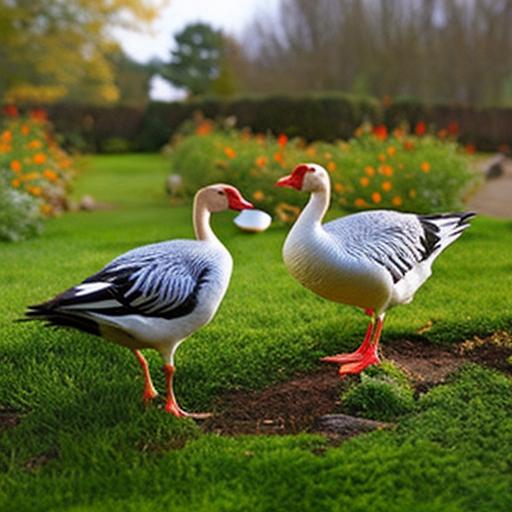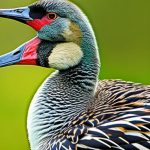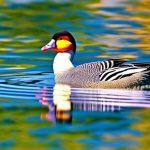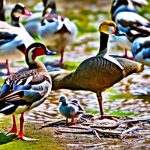Having geese on your property can be a nuisance. They can cause damage to your lawn, leave droppings everywhere, and even become aggressive towards humans or other animals. Fortunately, there are several methods you can use to keep geese away. In this article, we will explore different strategies to deter geese from your property, including physical barriers, noise deterrents, visual deterrents, taste deterrents, creating an unappealing environment, maintaining a clean outdoor space, using trained dogs, seeking professional help, and complying with legal considerations.
Key Takeaways
- Geese are social animals and tend to congregate in large groups.
- Physical barriers such as fences and netting can be effective in deterring geese.
- Noise deterrents such as loud noises or predator calls can scare geese away.
- Visual deterrents such as decoys or reflective tape can make geese feel uncomfortable and avoid the area.
- Taste deterrents such as bitter sprays can discourage geese from feeding in a particular area.
Understanding the behavior of geese
Before we delve into the different methods to keep geese away, it is important to understand their behavior. Geese are social animals that typically live in flocks. They are attracted to areas with open water, lush grass, and a lack of predators. Geese also have a strong homing instinct and tend to return to the same location year after year. Understanding these habits and behaviors will help you develop effective strategies to deter geese from your property.
Physical barriers to deter geese
One of the most effective ways to keep geese away is by installing physical barriers. There are several types of physical barriers that can be used, including fences, netting, and floating barriers. Fences should be at least three feet high and have small openings to prevent geese from squeezing through. Netting can be used to cover ponds or other bodies of water to prevent geese from landing. Floating barriers can be placed in water to create an obstacle for geese.
When installing physical barriers, it is important to ensure they are properly maintained. Regularly inspect fences for any damage or gaps that may allow geese to enter. Repair any holes or tears in netting promptly. Floating barriers should be regularly cleaned to prevent debris from accumulating and creating a platform for geese to land on.
Implementing noise deterrents
Another effective method to keep geese away is by using noise deterrents. Geese are sensitive to loud and unexpected noises, which can scare them away. There are several types of noise deterrents that can be used, including propane cannons, ultrasonic devices, and motion-activated sprinklers.
Propane cannons produce loud bangs at regular intervals to create a deterrent effect. Ultrasonic devices emit high-frequency sounds that are unpleasant to geese but not audible to humans. Motion-activated sprinklers spray water when geese approach, startling them and encouraging them to leave.
When using noise deterrents, it is important to use them strategically. Vary the timing and location of the deterrents to prevent geese from becoming accustomed to the noise. Regularly check and maintain the devices to ensure they are functioning properly.
Using visual deterrents to keep geese away
Visual deterrents can also be effective in deterring geese from your property. Geese are wary of unfamiliar objects and will avoid areas where they perceive a threat. There are several types of visual deterrents that can be used, including scarecrows, reflective tape, and predator decoys.
Scarecrows can be placed in open areas to create a visual deterrent for geese. Reflective tape can be hung from trees or poles to create movement and reflection, which can scare geese away. Predator decoys, such as plastic owls or coyotes, can be placed in strategic locations to create the illusion of a predator presence.
When using visual deterrents, it is important to regularly move and change their location to prevent geese from becoming accustomed to them. Additionally, ensure that the visual deterrents are properly maintained and in good condition.
Applying taste deterrents to discourage geese

Taste deterrents can be used to discourage geese from feeding on your property. These products make the grass and vegetation taste unpleasant to geese, discouraging them from grazing. There are several types of taste deterrents that can be used, including liquid sprays and granular repellents.
Liquid sprays can be applied directly to the grass and vegetation, making them unpalatable to geese. Granular repellents can be spread over the lawn and garden areas to create a barrier that geese will avoid.
When applying taste deterrents, it is important to follow the instructions on the product label. Apply the deterrents regularly, especially after rain or irrigation, as they may wash away. It is also important to reapply the deterrents as needed to maintain their effectiveness.
Creating an unappealing environment for geese
Creating an unappealing environment for geese is another effective way to keep them away from your property. Geese are attracted to areas with open water, lush grass, and a lack of predators. By modifying your property to make it less attractive to geese, you can discourage them from staying.
One way to create an unappealing environment is by reducing or eliminating open water sources. This can be done by installing pond netting or using floating barriers to cover ponds or other bodies of water. Additionally, reducing the amount of lush grass by mowing it shorter or replacing it with less attractive vegetation can make your property less appealing to geese.
Maintaining a clean and tidy outdoor space
Keeping your outdoor space clean and tidy is not only important for aesthetics but also for deterring geese. Geese are attracted to areas with abundant food sources, such as fallen berries or seeds. By regularly cleaning up fallen fruit, seeds, and other food sources, you can reduce the attractiveness of your property to geese.
Regularly remove any debris or clutter from your property, as geese may use these areas for nesting or roosting. Additionally, keep your lawn well-maintained by regularly mowing and removing weeds. A clean and tidy outdoor space will make your property less appealing to geese.
Using trained dogs to keep geese away
Using trained dogs to keep geese away is another effective method of deterrence. Dogs are natural predators to geese and their presence can create a deterrent effect. There are several breeds of dogs that are particularly effective at deterring geese, such as Border Collies and Labrador Retrievers.
To effectively use dogs to deter geese, it is important to properly train them. Dogs should be trained to respond to commands and be comfortable around water. They should also be trained to chase but not harm the geese. Regular exercise and socialization are also important for maintaining a well-behaved and effective deterrent dog.
Seeking professional help for geese control
In some cases, it may be necessary to seek professional help for geese control. If you have tried various methods and are still experiencing issues with geese on your property, a professional wildlife control company can provide specialized expertise and solutions.
When seeking professional help, it is important to do your research and find a reputable company. Look for companies that have experience in dealing with geese control and have positive reviews from previous customers. Additionally, ensure that the company follows ethical and humane practices in their approach to geese control.
Legal considerations when dealing with geese on your property
When dealing with geese on your property, it is important to consider the legal implications. In many areas, geese are protected under wildlife conservation laws, which means that certain methods of deterrence may be restricted or prohibited.
Before implementing any deterrent methods, it is important to familiarize yourself with local laws and regulations regarding geese control. Contact your local wildlife agency or municipality for information on any permits or restrictions that may apply. It is important to comply with these laws to avoid legal consequences.
In conclusion, there are several methods you can use to keep geese away from your property. These methods include physical barriers, noise deterrents, visual deterrents, taste deterrents, creating an unappealing environment, maintaining a clean outdoor space, using trained dogs, seeking professional help, and complying with legal considerations. By implementing these strategies and taking action, you can effectively deter geese and maintain a goose-free property.
If you’re interested in learning more about keeping chickens and want to expand your knowledge beyond keeping geese away, check out this informative article on how long it takes for chicken eggs to hatch naturally. Understanding the incubation process is crucial for successful breeding. You can find the article here: How Long for Chicken Eggs to Hatch Naturally. Additionally, if you’re considering converting a shed into a chicken coop, this article provides helpful tips and guidance: Convert Shed to Chicken Coop. Lastly, if you’re not ready to commit to building your own coop, renting a chicken coop might be a great option. Learn more about it here: Rent a Chicken Coop.
FAQs
What are some natural ways to keep geese away?
Some natural ways to keep geese away include using visual deterrents like scarecrows or reflective objects, planting tall grasses or shrubs to block their view, and using noise deterrents like wind chimes or predator calls.
Are there any commercial products available to keep geese away?
Yes, there are commercial products available to keep geese away such as goose repellent sprays, electronic deterrents, and physical barriers like fences or netting.
Why is it important to keep geese away?
Keeping geese away is important to prevent damage to property, reduce the risk of spreading diseases carried by geese, and maintain a clean and safe environment for humans and other wildlife.
How can I prevent geese from nesting on my property?
To prevent geese from nesting on your property, you can use visual deterrents, remove sources of food and water, and block off potential nesting sites with barriers or landscaping.
Are there any laws or regulations regarding how to keep geese away?
There may be local laws or regulations regarding how to keep geese away, especially if they are considered a protected species. It is important to check with your local wildlife authorities before implementing any deterrent methods.
Meet Walter, the feathered-friend fanatic of Florida! Nestled in the sunshine state, Walter struts through life with his feathered companions, clucking his way to happiness. With a coop that’s fancier than a five-star hotel, he’s the Don Juan of the chicken world. When he’s not teaching his hens to do the cha-cha, you’ll find him in a heated debate with his prized rooster, Sir Clucks-a-Lot. Walter’s poultry passion is no yolk; he’s the sunny-side-up guy you never knew you needed in your flock of friends!







